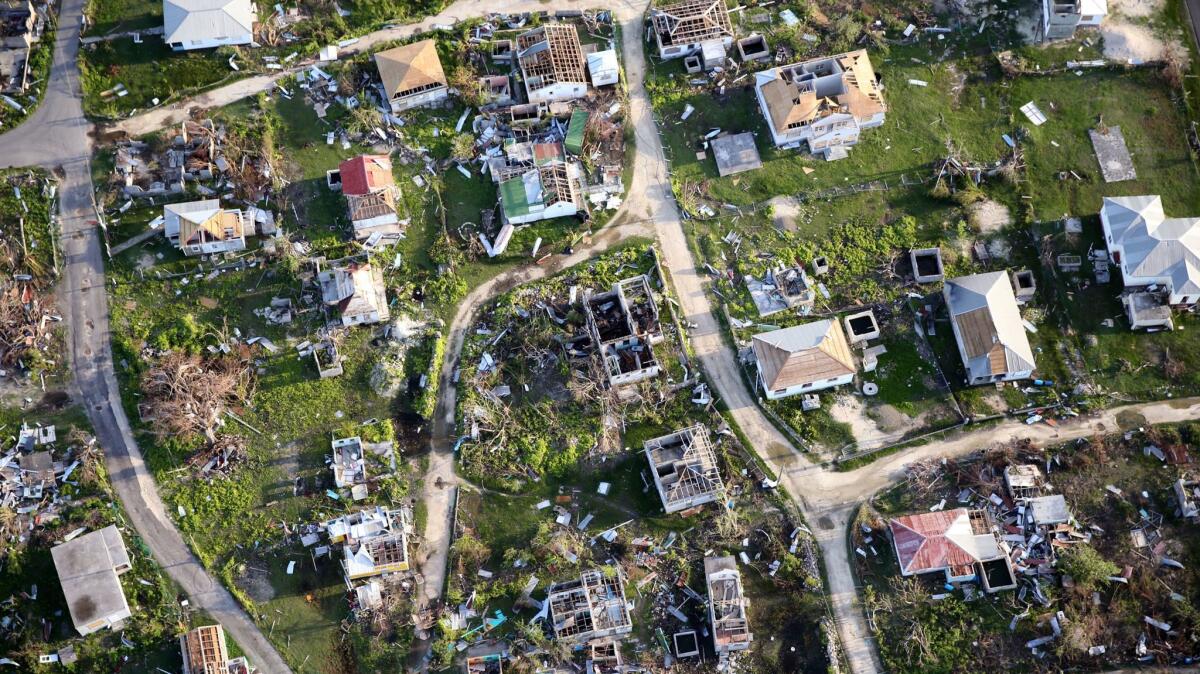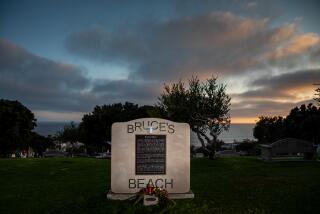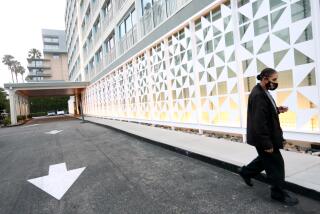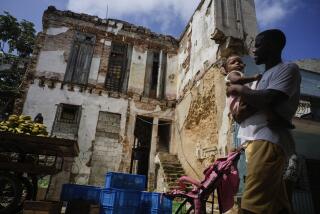Plans to rebuild hurricane-ravaged Barbuda reignite a decades-old land dispute

Reporting from St. John's, Antigua and Barbuda — The need to rebuild hurricane-ravaged Barbuda has reignited a decades-old dispute over who, if anyone, owns the land.
Most Barbudans say it belongs to the people under a historical tenure system that has allowed anybody of Barbudan descent to use a plot for free. But in the wake of Hurricane Irma, the government has renewed efforts to institute a system of formal individual ownership it says is necessary to get loans for reconstruction.
Gaston Browne, the prime minister of Antigua and Barbuda — a single nation formed in 1981 from the two Caribbean islands, both former British colonies — has proposed allowing Barbudans to buy the plots where they live for $1 each. The deeds they would receive in return could be used as collateral for bank loans to rebuild their homes, most of which were not insured.
“It’s a gift,” Browne said in an interview. “We are not taking anything from them. We are giving [to] them. It is a form of empowerment.”
He described the current arrangement in Barbuda as “squatting.”
“Previous governments have just ignored them, continuing in their foolishness,” he said. “We have taken the decision now that we will build an ownership class in Barbuda, that we will empower the people, and there is no good or bad time to empower the people. The time is now.”
Browne estimated that on its own the government would be able to raise no more than $50 million to rebuild Barbuda — far shy of the preliminary damage estimate of $250 million. The storm rendered most of the island uninhabitable.
This is a deliberate plan by the Gaston Browne government to steal Barbuda from us
— politician Trevor Walker
But his plans for a deed system have been met with deep suspicion that it is the first step in a land grab. If land can be bought and sold, the thinking goes, then foreigners could buy it and create private enclaves.
Foreigners have long been able to lease land, and even that has been controversial. A project led by movie star Robert De Niro and Australian billionaire James Packer to revamp a long-shuttered luxury resort has drawn protests because the terms of the lease are extremely favorable to the investors.
Some government officials say such deals are the only way to draw much-needed investment and development. The prime minister said that without modernizing the economy, Barbuda would continue to function as a “welfare island.”
In an indication of just how hot emotions run on the land issue, Kendra Beazer, a member of the Barbuda Council, the government body whose duties include administering the land, described the government’s plan as “an opportunity for disaster capitalism and cultural genocide.”
“If they were to get through with this, then everything that is known to be Barbudan will change automatically — how we go about applying for a piece of land, how we go about building our homes, how we go about starting our businesses,” he said. “As it stands, a cleaner can apply for beachfront property and get it, and so can a doctor. So there’s no great inequality in Barbuda.”
“If you’re going to start to sell land, can this cleaner now afford to pay the same mortgage as that doctor to have that beachfront property? No. We’re going to have the super rich now and you’re going to create poverty in Barbuda with this change in land system.”
Trevor Walker, a former member of Parliament, said that coming in the midst of a disaster, the proposal smacked of opportunism.
“This is a deliberate plan by the Gaston Browne government to steal Barbuda from us,” he told a crowd of Barbudans at a recent rally in Antigua, where they have been living with friends, relatives or strangers since early September, when all 1,800 residents were evacuated after the hurricane. “If we’re not careful, it’s going to be uninhabitable for us, but habitable for somebody else.”
Barbuda has long existed in the shadow of Antigua, 35 miles to the south and home to 93,000 people and the nation’s capital, St. John’s. Land ownership is the norm in Antigua.
The communal system in Barbuda stems from the widespread — and disputed — belief that after the British colonies ended slavery in 1834, the former slave owners left the land to the slaves and their descendants.
Over the years, Barbudans have fought off numerous attempts at what they view as a push to exploit and sell off their land, including suing over past governments’ mining of the island’s famous pink sands, because they said Barbudans were not benefiting from the profits.
The communal land system was formally enshrined in law with the 2007 passage of the Barbuda Land Act.
The political party that shepherded that law is now in the opposition.
Browne called the land act illegal because the country’s constitution states that Antigua and Barbuda is a unitary state and there are only two types of land ownership: leasehold or freehold. He said that it made no sense that the former slave holders could have gifted the land, because they were leasing it from the British crown.
Juno Samuel, former chairman of the Antigua and Barbuda Electioral Commission, said Barbudans own the land unless a court rules that the 2007 law is unconstitutional.
“If the law says that the land is held in common, Browne can’t sell them the land because it’s already theirs,” he said.
This story was reported with a grant from the United Nations Foundation.
For more on global development news, see our Global Development Watch page, and follow me @AMSimmons1 on Twitter
More to Read
Sign up for Essential California
The most important California stories and recommendations in your inbox every morning.
You may occasionally receive promotional content from the Los Angeles Times.











